Array
(
[0] => WP_Post Object
(
[ID] => 9178
[post_author] => 9
[post_date] => 2019-09-01 09:33:56
[post_date_gmt] => 2019-09-01 09:33:56
[post_content] => Member in the Spotlight
An interview with Nick Jones, Founder and CEO of Ligentia
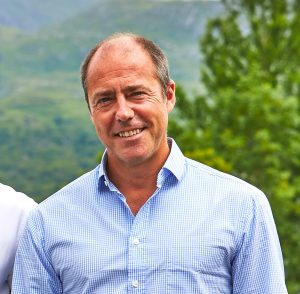 Tell us about your company.
Ligentia is the UK’s largest and fastest growing international freight technology business. Myself and 500 colleagues around the world manage the international freight and supply chains for some of the worlds leading retailers, consumer brands, and manufacturers. We work with a cross section of multi-nationals, SME’s and home office start-ups, and develop long lasting partnerships with most customers, many of whom we have grown internationally with over a long period of time.
We combine clever but easy to use technology, deep sector and regional expertise, with 365/24/7 customer service (delivered by long serving Ligentia industry experts not call centres) to ensure our customers can focus on design, manufacture, marketing and sales, and leave us to deal with factories, suppliers, making sure products and material are in the right place, at the right time and in the right quantity.
We also support customers in reducing carbon footprint with simple and cost effective initiatives that benefit them, their customers and the planet.
What has been your biggest success so far?
We grew our international business from scratch in 2010 to a position where, this year, over 50% of our profits now come from our offices in China, Asia, Australia, Africa and Poland. We did this all from cash flow and with no long term debt. It was a massive challenge, a major investment of time and cash, and a big risk to do this during the Global Financial Crisis. We pulled it off, and are now a much more balanced and multi-cultural organisation, and in some very fast growing international markets.
What projects excite you right now?
There are 2 major projects we are really excited about!
The first is our investment in a new technology centre of excellence in Leeds. We are investing around £8m over the next 3 years in next generation technologies such as automation, artificial intelligence, machine learning, dynamic pricing and data analytics, all housed in a brand new low carbon tech centre in Leeds called Nexus (a part of Leeds University) We have an official launch in September, but are already open and recruiting some of the finest tech talent to support the project.
Our second is what we are calling ‘Ligentia Remastered’ This a complete internal and external realignment of the business with what is a radically different environment than 10 years ago. This is very much not a skin deep rebrand, but a radical remastering of how we work, communicate with customers, internal values, and ways of working. A lot of focus is on simplifying language, creating self-help tools, knowledge hubs and tools to make our services and knowledge cheaper and easier to access. We are driving more open pricing, improving communication with live chat via WhatsApp and WeChat, and focussing on creating an international community that makes it easy for local and international customers to collaborate by sharing transport, freight space and costs. Equally, people who devote their lives to public service are pretty inspirational.
How has being a member of The Clubhouse contributed to the success of your business?
Collaboration and innovation are really important cultural enablers for us, and work space is critical to creating the right environment. The Clubhouse was our first experience with co-working spaces, and is fast becoming a centre of gravity for us in the UK, as it combines great locations, flexible costs and a sophisticated energy which would not be affordable to us in a traditional lease arrangement. We are freed from all the lease, IT, furniture, and facility management stuff, and it leaves us to focus on customers and technology.
We are now big believers in the use of co-working work spaces, and I think we will see many of our smaller offices gradually move this way over the next 3-5 years.
Where can members find you?
We base ourselves mainly at St James, and I’m normally close to a coffee machine.
Quick Fire Round:
Favourite place to go in London?
We love Thali on the Old Brompton Road, South Ken. It’s the best Indian restaurant in London, and Vic and his team are super friendly.
Who inspires you and why?
People who devote their lives to public service are pretty inspirational, as are entrepreneurs who create fast growing business based on innovative ideas and products that care for the planet, and employee people in a happy and rewarding environment. Creating wealth from doing the right thing in the right way is becoming more common, thankfully.
Best bit of advice you’ve been given?
My wife always says ‘Go with your gut’ and I think intuition is under-rated. Our sub-conscious starts absorbing experiences, images, sounds, smells, expressions, thoughts and outcomes, from when we are born. We all have this truly multi-dimensional database in our heads, and we should learn to have the confidence to use it more.
Which super power would you like to have?
Superman type flight (without the tights) would be pretty handy and be good for the planet.
What is the worst business ‘faux-pas’ you’ve committed?
I went pretty hard-sell in a meeting in China in the 90’s before I understood how things worked, and clearly got no-where. Making mistakes is a part of life, but developing an understanding of how business is done, a respect for the culture and values in the place you do business is critical if you want to succeed internationally.
For more about Ligentia visit their website: Ligentia.com
[post_title] => Ligentia Global
[post_excerpt] =>
[post_status] => publish
[comment_status] => closed
[ping_status] => closed
[post_password] =>
[post_name] => ligentia-global
[to_ping] =>
[pinged] =>
[post_modified] => 2019-09-03 14:34:21
[post_modified_gmt] => 2019-09-03 14:34:21
[post_content_filtered] =>
[post_parent] => 0
[guid] => http://www.theclubhouseoffices.com/?p=9178
[menu_order] => 0
[post_type] => post
[post_mime_type] =>
[comment_count] => 0
[filter] => raw
)
[1] => WP_Post Object
(
[ID] => 9249
[post_author] => 9
[post_date] => 2019-10-02 08:47:24
[post_date_gmt] => 2019-10-02 08:47:24
[post_content] => Continuing our partnership with Mishcon de Reya, this session will provide an insight into the challenges and opportunities involved in establishing an effective intellectual property strategy, how to protect your brand in a digital age and steps companies can take to secure their position considering Brexit. Sally Britton, Partner and Head of Brands at Mishcon, will deliver the session. Representing some of the world's most well-known brands, Sally's practice is ranked Tier One by Legal 500 for Brand Management Services and in Chambers' Spotlight table (its top tier) for law firms with trade mark practices.
8:00am – 8:30am Light breakfast and refreshments
8:30am – 9:30am Presentation
9:30am – 10:00am Further Q&A
FREE FOR MEMBERS AND THEIR GUESTS / £25 FOR NON-MEMBERS
Speakers:
Sally Britton, Partner and Head of Brands at Mishcon de Reya
Sally is a partner in the firm's Intellectual Property department and Head of the Brands group. She advises on brand protection strategies including clearance, monitoring and enforcement as well as trade mark and design filing. She acts for brands at all stages, from creation through to international expansion, both in preparation for investment and following acquisition.
Tell us about your company.
Ligentia is the UK’s largest and fastest growing international freight technology business. Myself and 500 colleagues around the world manage the international freight and supply chains for some of the worlds leading retailers, consumer brands, and manufacturers. We work with a cross section of multi-nationals, SME’s and home office start-ups, and develop long lasting partnerships with most customers, many of whom we have grown internationally with over a long period of time.
We combine clever but easy to use technology, deep sector and regional expertise, with 365/24/7 customer service (delivered by long serving Ligentia industry experts not call centres) to ensure our customers can focus on design, manufacture, marketing and sales, and leave us to deal with factories, suppliers, making sure products and material are in the right place, at the right time and in the right quantity.
We also support customers in reducing carbon footprint with simple and cost effective initiatives that benefit them, their customers and the planet.
What has been your biggest success so far?
We grew our international business from scratch in 2010 to a position where, this year, over 50% of our profits now come from our offices in China, Asia, Australia, Africa and Poland. We did this all from cash flow and with no long term debt. It was a massive challenge, a major investment of time and cash, and a big risk to do this during the Global Financial Crisis. We pulled it off, and are now a much more balanced and multi-cultural organisation, and in some very fast growing international markets.
What projects excite you right now?
There are 2 major projects we are really excited about!
The first is our investment in a new technology centre of excellence in Leeds. We are investing around £8m over the next 3 years in next generation technologies such as automation, artificial intelligence, machine learning, dynamic pricing and data analytics, all housed in a brand new low carbon tech centre in Leeds called Nexus (a part of Leeds University) We have an official launch in September, but are already open and recruiting some of the finest tech talent to support the project.
Our second is what we are calling ‘Ligentia Remastered’ This a complete internal and external realignment of the business with what is a radically different environment than 10 years ago. This is very much not a skin deep rebrand, but a radical remastering of how we work, communicate with customers, internal values, and ways of working. A lot of focus is on simplifying language, creating self-help tools, knowledge hubs and tools to make our services and knowledge cheaper and easier to access. We are driving more open pricing, improving communication with live chat via WhatsApp and WeChat, and focussing on creating an international community that makes it easy for local and international customers to collaborate by sharing transport, freight space and costs. Equally, people who devote their lives to public service are pretty inspirational.
How has being a member of The Clubhouse contributed to the success of your business?
Collaboration and innovation are really important cultural enablers for us, and work space is critical to creating the right environment. The Clubhouse was our first experience with co-working spaces, and is fast becoming a centre of gravity for us in the UK, as it combines great locations, flexible costs and a sophisticated energy which would not be affordable to us in a traditional lease arrangement. We are freed from all the lease, IT, furniture, and facility management stuff, and it leaves us to focus on customers and technology.
We are now big believers in the use of co-working work spaces, and I think we will see many of our smaller offices gradually move this way over the next 3-5 years.
Where can members find you?
We base ourselves mainly at St James, and I’m normally close to a coffee machine.
Quick Fire Round:
Favourite place to go in London?
We love Thali on the Old Brompton Road, South Ken. It’s the best Indian restaurant in London, and Vic and his team are super friendly.
Who inspires you and why?
People who devote their lives to public service are pretty inspirational, as are entrepreneurs who create fast growing business based on innovative ideas and products that care for the planet, and employee people in a happy and rewarding environment. Creating wealth from doing the right thing in the right way is becoming more common, thankfully.
Best bit of advice you’ve been given?
My wife always says ‘Go with your gut’ and I think intuition is under-rated. Our sub-conscious starts absorbing experiences, images, sounds, smells, expressions, thoughts and outcomes, from when we are born. We all have this truly multi-dimensional database in our heads, and we should learn to have the confidence to use it more.
Which super power would you like to have?
Superman type flight (without the tights) would be pretty handy and be good for the planet.
What is the worst business ‘faux-pas’ you’ve committed?
I went pretty hard-sell in a meeting in China in the 90’s before I understood how things worked, and clearly got no-where. Making mistakes is a part of life, but developing an understanding of how business is done, a respect for the culture and values in the place you do business is critical if you want to succeed internationally.
For more about Ligentia visit their website: Ligentia.com
[post_title] => Ligentia Global
[post_excerpt] =>
[post_status] => publish
[comment_status] => closed
[ping_status] => closed
[post_password] =>
[post_name] => ligentia-global
[to_ping] =>
[pinged] =>
[post_modified] => 2019-09-03 14:34:21
[post_modified_gmt] => 2019-09-03 14:34:21
[post_content_filtered] =>
[post_parent] => 0
[guid] => http://www.theclubhouseoffices.com/?p=9178
[menu_order] => 0
[post_type] => post
[post_mime_type] =>
[comment_count] => 0
[filter] => raw
)
[1] => WP_Post Object
(
[ID] => 9249
[post_author] => 9
[post_date] => 2019-10-02 08:47:24
[post_date_gmt] => 2019-10-02 08:47:24
[post_content] => Continuing our partnership with Mishcon de Reya, this session will provide an insight into the challenges and opportunities involved in establishing an effective intellectual property strategy, how to protect your brand in a digital age and steps companies can take to secure their position considering Brexit. Sally Britton, Partner and Head of Brands at Mishcon, will deliver the session. Representing some of the world's most well-known brands, Sally's practice is ranked Tier One by Legal 500 for Brand Management Services and in Chambers' Spotlight table (its top tier) for law firms with trade mark practices.
8:00am – 8:30am Light breakfast and refreshments
8:30am – 9:30am Presentation
9:30am – 10:00am Further Q&A
FREE FOR MEMBERS AND THEIR GUESTS / £25 FOR NON-MEMBERS
Speakers:
Sally Britton, Partner and Head of Brands at Mishcon de Reya
Sally is a partner in the firm's Intellectual Property department and Head of the Brands group. She advises on brand protection strategies including clearance, monitoring and enforcement as well as trade mark and design filing. She acts for brands at all stages, from creation through to international expansion, both in preparation for investment and following acquisition.
 This event is hosted by Mishcon de Reya, a London based law firm advising some of the most exciting fast-growth businesses in the UK and a legal partner to The Clubhouse. To learn more about the partnership and what Mishcon de Reya can offer you, please click here Mishcon de Reya
[post_title] => Members Breakfast: Brand Protection Masterclass
[post_excerpt] =>
[post_status] => publish
[comment_status] => closed
[ping_status] => closed
[post_password] =>
[post_name] => members-breakfast-brand-protection-masterclass
[to_ping] =>
[pinged] =>
[post_modified] => 2019-10-04 08:30:41
[post_modified_gmt] => 2019-10-04 08:30:41
[post_content_filtered] =>
[post_parent] => 0
[guid] => http://www.theclubhouseoffices.com/?p=9249
[menu_order] => 0
[post_type] => post
[post_mime_type] =>
[comment_count] => 0
[filter] => raw
)
[2] => WP_Post Object
(
[ID] => 9204
[post_author] => 9
[post_date] => 2019-09-01 09:08:23
[post_date_gmt] => 2019-09-01 09:08:23
[post_content] => It’s been shown that when it comes to hiring and keeping great people, better cultural ‘fit’ at work results in higher levels of job satisfaction and performance and a willingness to stay longer. (Ref: Kristof-Brown et al. Personnel Psychology 2005).
Consistently finding people who’ll be a good cultural fit (meaning they share values and norms with the majority of their colleagues) and therefore thrive in an organisation begins with an appreciation that organisational culture is not just the bits we see or consciously think about. The real opportunity (and potential de-railers) sit beneath the waterline, exerting huge influence on whether a new hire will sink or swim.
Layers of culture
If an organisation has spent time defining their culture, it’s likely the process will have delivered a set of organisational values and ‘ideal’ behaviours that bring these to life. The thinking is that if everyone in the organisation behaves in an agreed way, the culture will be as it needs to be to deliver the strategy.
But culture is ultimately governed by the deepest roots of our collective psychology. Edgar Schein’s iceberg model (fig 1), highlights the hidden roots of culture, with the foundation being our underlying beliefs – those things that start as subjective values, but over time become embedded and unconsciously accepted as ‘the way things are’.
This event is hosted by Mishcon de Reya, a London based law firm advising some of the most exciting fast-growth businesses in the UK and a legal partner to The Clubhouse. To learn more about the partnership and what Mishcon de Reya can offer you, please click here Mishcon de Reya
[post_title] => Members Breakfast: Brand Protection Masterclass
[post_excerpt] =>
[post_status] => publish
[comment_status] => closed
[ping_status] => closed
[post_password] =>
[post_name] => members-breakfast-brand-protection-masterclass
[to_ping] =>
[pinged] =>
[post_modified] => 2019-10-04 08:30:41
[post_modified_gmt] => 2019-10-04 08:30:41
[post_content_filtered] =>
[post_parent] => 0
[guid] => http://www.theclubhouseoffices.com/?p=9249
[menu_order] => 0
[post_type] => post
[post_mime_type] =>
[comment_count] => 0
[filter] => raw
)
[2] => WP_Post Object
(
[ID] => 9204
[post_author] => 9
[post_date] => 2019-09-01 09:08:23
[post_date_gmt] => 2019-09-01 09:08:23
[post_content] => It’s been shown that when it comes to hiring and keeping great people, better cultural ‘fit’ at work results in higher levels of job satisfaction and performance and a willingness to stay longer. (Ref: Kristof-Brown et al. Personnel Psychology 2005).
Consistently finding people who’ll be a good cultural fit (meaning they share values and norms with the majority of their colleagues) and therefore thrive in an organisation begins with an appreciation that organisational culture is not just the bits we see or consciously think about. The real opportunity (and potential de-railers) sit beneath the waterline, exerting huge influence on whether a new hire will sink or swim.
Layers of culture
If an organisation has spent time defining their culture, it’s likely the process will have delivered a set of organisational values and ‘ideal’ behaviours that bring these to life. The thinking is that if everyone in the organisation behaves in an agreed way, the culture will be as it needs to be to deliver the strategy.
But culture is ultimately governed by the deepest roots of our collective psychology. Edgar Schein’s iceberg model (fig 1), highlights the hidden roots of culture, with the foundation being our underlying beliefs – those things that start as subjective values, but over time become embedded and unconsciously accepted as ‘the way things are’.
 The way things are
Underlying beliefs are incredibly powerful. They are what can keep cultures stuck and drive how we act, what we pay attention to and the decisions we make. They are often difficult to describe, intangible, and only understood by people who've become used to the way the organisation works over a period of time.
These assumptions are one of the things that can make it hard for new recruits to ‘fit in’. Anyone who has joined an organisation will recognise the feeling of being the newbie – getting to grips with what’s allowed, tolerated and required in the course of getting work done e.g. Is it OK to bring half-formed ideas to the table or do I need a fully worked up proposal? Can I knock on a senior leader’s office door or do I have to make an appointment?
Three ways to help people fit in and flourish
So how can we use our understanding of the culture iceberg to help us both recruit people who are a good culture fit and help them ‘fit in’ and flourish quickly?
1.Understand the underpinnings of your culture
If a definition of the organisation’s culture already exists, sense check whether it goes deep enough to include existing assumptions and beliefs. If not, explore them.
Use a method like appreciative inquiry to uncover the beliefs that are helping the organisation and that you might want to amplify. Or simply introduce conversational prompts like ‘What are we assuming here?’ or ‘What are we taking for granted?’ to increase awareness of what may be going on beneath the surface. There may be things that are currently hidden that need to be noticed and talked about in order to help new recruits integrate quickly and be successful.
2. Paint an accurate picture
Often the ‘official’ values and expected behaviours of an organisation don’t fully represent reality but are still what we rely on to market our organisational culture to prospective team members. Our intent is to help them understand whether they want to be part of the organisation and how well they’ll fit in. But it can lead to a mismatch between expectations and reality, undermining trust from the get-go.
Describe your culture accurately and honestly. Better to say we are ‘working towards’ or ‘aspire to have’ a innovative culture rather than say the culture is one of innovation when it isn’t…yet.
3. Watch for the pitfalls
Hiring managers are people and, if they’ve been in their role for any length of time, are likely to have assimilated the organisation’s norms. Be aware that this can result in unconscious flaws in the recruitment process. For example an organisation has built a successful legacy on a foundation of quality and safety but aims to respond to competitive pressures by becoming more innovative. They decide to hire more ‘green’ thinkers – people with behaviours and mindsets that support innovation.
As the process gets underway, the hiring manager becomes unconsciously conflicted by their unchanged legacy beliefs like, “a safe pair of hands is what works best for us”. As a result, the search slowly widens to find candidates who fulfil both the old and new criteria. The expectations are unrealistic and either a match can’t be found, or the manager settles for a hire who doesn’t quite hit the original brief. As a result, the new strategy is compromised from the outset.
Equip hiring managers with the tools and ability to consciously choose which old ideas to let go of, and what trade-offs they may need to be open to in order to bring in the behaviours you are seeking.
Summary
Culture is the character of the organisation. Those that cultivate strong, attractive characters understand the behaviours they need to deliver their goals and the beliefs that reinforce or get in the way of those behaviours. Using this understanding to shape every touchpoint through an employee’s journey ensures the right people are attracted and recruited and that they want to stay and get fully involved. Ultimately, we can build a consistent and collective culture that focusses effort, helps people work together and make decisions with more ease and greater impact because of the shared sense of who we are, what’s necessary and what’s important.
This article was written by Caroline Gosling, Director of Culture & Engagement at Rubica Change & Analytics: www.rubica.co.uk
[post_title] => Deep is meaningful: the invisible aspects of company culture are the secret to attracting, and keeping, great people
[post_excerpt] =>
[post_status] => publish
[comment_status] => closed
[ping_status] => closed
[post_password] =>
[post_name] => deep-is-meaningful-the-invisible-aspects-of-company-culture-are-the-secret-to-attracting-and-keeping-great-people
[to_ping] =>
[pinged] =>
[post_modified] => 2019-11-07 11:05:19
[post_modified_gmt] => 2019-11-07 11:05:19
[post_content_filtered] =>
[post_parent] => 0
[guid] => http://www.theclubhouseoffices.com/?p=9204
[menu_order] => 0
[post_type] => post
[post_mime_type] =>
[comment_count] => 0
[filter] => raw
)
[3] => WP_Post Object
(
[ID] => 9243
[post_author] => 9
[post_date] => 2019-09-01 08:19:10
[post_date_gmt] => 2019-09-01 08:19:10
[post_content] => Recently, companies have been reverting to more simplistic brand identities. In May 2019, BT announced the launch of a new brand identity featuring the letters BT in a circle logo (having filed a UK trade mark application in black and white for the logo back in 2016). Warner Bros. Records has re-branded to Warner Records and unveiled a new black and white logo to replace its shield logo. Fashion houses such as Burberry and Diane Von Furstenberg have also adopted the less is more approach, and rebranded to chunky bold fonts over their previous more stylised fonts.
When adopting a more simplistic logo, however, it is important to bear in mind issues of registrability and enforcement that may be more problematic for such logos. In particular, the simpler a logo is, the greater the risk is of it not having the requisite distinctive character, or of it coming up against third party rights. Some recent cases concerning EU and UK marks demonstrate these issues.
Adidas three stripes mark
In June 2019, the EU General Court issued its decision in Adidas AG & Marques (Intervener) v EUIPO concerning Adidas' figurative mark for "clothing, footwear, headgear", the description for which is: "The mark consists of three parallel equidistant stripes of equal width applied to the product in whichever direction." Partner Sally Britton discussed the decision of the General Court on the BBC News Channel.
The way things are
Underlying beliefs are incredibly powerful. They are what can keep cultures stuck and drive how we act, what we pay attention to and the decisions we make. They are often difficult to describe, intangible, and only understood by people who've become used to the way the organisation works over a period of time.
These assumptions are one of the things that can make it hard for new recruits to ‘fit in’. Anyone who has joined an organisation will recognise the feeling of being the newbie – getting to grips with what’s allowed, tolerated and required in the course of getting work done e.g. Is it OK to bring half-formed ideas to the table or do I need a fully worked up proposal? Can I knock on a senior leader’s office door or do I have to make an appointment?
Three ways to help people fit in and flourish
So how can we use our understanding of the culture iceberg to help us both recruit people who are a good culture fit and help them ‘fit in’ and flourish quickly?
1.Understand the underpinnings of your culture
If a definition of the organisation’s culture already exists, sense check whether it goes deep enough to include existing assumptions and beliefs. If not, explore them.
Use a method like appreciative inquiry to uncover the beliefs that are helping the organisation and that you might want to amplify. Or simply introduce conversational prompts like ‘What are we assuming here?’ or ‘What are we taking for granted?’ to increase awareness of what may be going on beneath the surface. There may be things that are currently hidden that need to be noticed and talked about in order to help new recruits integrate quickly and be successful.
2. Paint an accurate picture
Often the ‘official’ values and expected behaviours of an organisation don’t fully represent reality but are still what we rely on to market our organisational culture to prospective team members. Our intent is to help them understand whether they want to be part of the organisation and how well they’ll fit in. But it can lead to a mismatch between expectations and reality, undermining trust from the get-go.
Describe your culture accurately and honestly. Better to say we are ‘working towards’ or ‘aspire to have’ a innovative culture rather than say the culture is one of innovation when it isn’t…yet.
3. Watch for the pitfalls
Hiring managers are people and, if they’ve been in their role for any length of time, are likely to have assimilated the organisation’s norms. Be aware that this can result in unconscious flaws in the recruitment process. For example an organisation has built a successful legacy on a foundation of quality and safety but aims to respond to competitive pressures by becoming more innovative. They decide to hire more ‘green’ thinkers – people with behaviours and mindsets that support innovation.
As the process gets underway, the hiring manager becomes unconsciously conflicted by their unchanged legacy beliefs like, “a safe pair of hands is what works best for us”. As a result, the search slowly widens to find candidates who fulfil both the old and new criteria. The expectations are unrealistic and either a match can’t be found, or the manager settles for a hire who doesn’t quite hit the original brief. As a result, the new strategy is compromised from the outset.
Equip hiring managers with the tools and ability to consciously choose which old ideas to let go of, and what trade-offs they may need to be open to in order to bring in the behaviours you are seeking.
Summary
Culture is the character of the organisation. Those that cultivate strong, attractive characters understand the behaviours they need to deliver their goals and the beliefs that reinforce or get in the way of those behaviours. Using this understanding to shape every touchpoint through an employee’s journey ensures the right people are attracted and recruited and that they want to stay and get fully involved. Ultimately, we can build a consistent and collective culture that focusses effort, helps people work together and make decisions with more ease and greater impact because of the shared sense of who we are, what’s necessary and what’s important.
This article was written by Caroline Gosling, Director of Culture & Engagement at Rubica Change & Analytics: www.rubica.co.uk
[post_title] => Deep is meaningful: the invisible aspects of company culture are the secret to attracting, and keeping, great people
[post_excerpt] =>
[post_status] => publish
[comment_status] => closed
[ping_status] => closed
[post_password] =>
[post_name] => deep-is-meaningful-the-invisible-aspects-of-company-culture-are-the-secret-to-attracting-and-keeping-great-people
[to_ping] =>
[pinged] =>
[post_modified] => 2019-11-07 11:05:19
[post_modified_gmt] => 2019-11-07 11:05:19
[post_content_filtered] =>
[post_parent] => 0
[guid] => http://www.theclubhouseoffices.com/?p=9204
[menu_order] => 0
[post_type] => post
[post_mime_type] =>
[comment_count] => 0
[filter] => raw
)
[3] => WP_Post Object
(
[ID] => 9243
[post_author] => 9
[post_date] => 2019-09-01 08:19:10
[post_date_gmt] => 2019-09-01 08:19:10
[post_content] => Recently, companies have been reverting to more simplistic brand identities. In May 2019, BT announced the launch of a new brand identity featuring the letters BT in a circle logo (having filed a UK trade mark application in black and white for the logo back in 2016). Warner Bros. Records has re-branded to Warner Records and unveiled a new black and white logo to replace its shield logo. Fashion houses such as Burberry and Diane Von Furstenberg have also adopted the less is more approach, and rebranded to chunky bold fonts over their previous more stylised fonts.
When adopting a more simplistic logo, however, it is important to bear in mind issues of registrability and enforcement that may be more problematic for such logos. In particular, the simpler a logo is, the greater the risk is of it not having the requisite distinctive character, or of it coming up against third party rights. Some recent cases concerning EU and UK marks demonstrate these issues.
Adidas three stripes mark
In June 2019, the EU General Court issued its decision in Adidas AG & Marques (Intervener) v EUIPO concerning Adidas' figurative mark for "clothing, footwear, headgear", the description for which is: "The mark consists of three parallel equidistant stripes of equal width applied to the product in whichever direction." Partner Sally Britton discussed the decision of the General Court on the BBC News Channel.
 The decision is part of a long-running dispute between Adidas and Belgian company Shoe Branding Europe BVBA, which owns the Patrick sportswear brand (featuring a two stripe logo). In 2014, Shoe Branding filed an application for a declaration of invalidity of Adidas' mark on the basis that it was devoid of any distinctive character.
Adidas argued that the mark had acquired distinctive character through use but, despite producing almost 12,000 pages of evidence relating to its use, the General Court agreed with the EUIPO that Adidas had not identified sufficient evidence of use of the mark as registered. Adidas also tried to argue that the mark should be considered as a pattern mark, rather than a figurative mark. The General Court disagreed with Adidas and noted that the EUIPO can only consider what is set out in the application for registration and corresponding description.
In relation to acquired distinctiveness, much of Adidas' evidence showed use of signs which, the Board of Appeal had concluded, differed from the mark significantly, for example, where the colour scheme was reversed (i.e. white stripes on a black background) and use of sloping signs. These uses altered the distinctive character of the mark as registered. In particular, the General Court took into account the "extreme simplicity" of Adidas' mark, stating that, "the simpler the mark, the less likely it is to have a distinctive character and the more likely it is for an alteration to that mark to affect one of its essential characteristics and the perception of that mark by the relevant public".
Further, Adidas had to show use of the mark throughout the EU to demonstrate acquired distinctiveness. Whilst it had produced 23 market surveys in a number of EU member states, only five of those were relevant, with the other 18 being carried out in relation to signs that were not broadly equivalent to the mark as registered. Whilst the CJEU confirmed in the KitKat case (discussed in our July 2018 edition), that it would be unreasonable to require separate evidence of acquired distinctiveness in each Member State, here the results of the five surveys that were on point could not be extrapolated to all Member States.
The case also bears some parallels with McDonald's' failure earlier this year to prove genuine use of its BIG MAC trade mark, where again the issue centred on the quality of the evidence. It is likely that Adidas will appeal to the Court of Justice, and it does of course have a number of other three stripe EUTM registrations. However, it is crucial that businesses use trade marks in the same form as they are registered or are intended to be registered, to increase the chances of being able to prove evidence of acquired distinctiveness.
Simple shapes
Simple shapes may also be more likely to come up against conflict with third party rights, as demonstrated by two recent UKIPO cases, with the outcome depending upon the visual and conceptual comparison between the relevant marks. In the first case (concerning Samsoe & Samsoe Holding A/S and Jolley Good Ltd), Jolley, a sports apparel company, had applied to register the logo pictured below as a UK trade mark for various clothing related goods. Samsoe, a Danish clothing company, opposed on the basis of identity and confusing similarity with its earlier EU trade mark, which covered amongst other things, clothing related goods.
The decision is part of a long-running dispute between Adidas and Belgian company Shoe Branding Europe BVBA, which owns the Patrick sportswear brand (featuring a two stripe logo). In 2014, Shoe Branding filed an application for a declaration of invalidity of Adidas' mark on the basis that it was devoid of any distinctive character.
Adidas argued that the mark had acquired distinctive character through use but, despite producing almost 12,000 pages of evidence relating to its use, the General Court agreed with the EUIPO that Adidas had not identified sufficient evidence of use of the mark as registered. Adidas also tried to argue that the mark should be considered as a pattern mark, rather than a figurative mark. The General Court disagreed with Adidas and noted that the EUIPO can only consider what is set out in the application for registration and corresponding description.
In relation to acquired distinctiveness, much of Adidas' evidence showed use of signs which, the Board of Appeal had concluded, differed from the mark significantly, for example, where the colour scheme was reversed (i.e. white stripes on a black background) and use of sloping signs. These uses altered the distinctive character of the mark as registered. In particular, the General Court took into account the "extreme simplicity" of Adidas' mark, stating that, "the simpler the mark, the less likely it is to have a distinctive character and the more likely it is for an alteration to that mark to affect one of its essential characteristics and the perception of that mark by the relevant public".
Further, Adidas had to show use of the mark throughout the EU to demonstrate acquired distinctiveness. Whilst it had produced 23 market surveys in a number of EU member states, only five of those were relevant, with the other 18 being carried out in relation to signs that were not broadly equivalent to the mark as registered. Whilst the CJEU confirmed in the KitKat case (discussed in our July 2018 edition), that it would be unreasonable to require separate evidence of acquired distinctiveness in each Member State, here the results of the five surveys that were on point could not be extrapolated to all Member States.
The case also bears some parallels with McDonald's' failure earlier this year to prove genuine use of its BIG MAC trade mark, where again the issue centred on the quality of the evidence. It is likely that Adidas will appeal to the Court of Justice, and it does of course have a number of other three stripe EUTM registrations. However, it is crucial that businesses use trade marks in the same form as they are registered or are intended to be registered, to increase the chances of being able to prove evidence of acquired distinctiveness.
Simple shapes
Simple shapes may also be more likely to come up against conflict with third party rights, as demonstrated by two recent UKIPO cases, with the outcome depending upon the visual and conceptual comparison between the relevant marks. In the first case (concerning Samsoe & Samsoe Holding A/S and Jolley Good Ltd), Jolley, a sports apparel company, had applied to register the logo pictured below as a UK trade mark for various clothing related goods. Samsoe, a Danish clothing company, opposed on the basis of identity and confusing similarity with its earlier EU trade mark, which covered amongst other things, clothing related goods.
 Jolley argued that its application represented the centre circle of a football pitch, which was consistent with its existing brand (Next Goal Wins) for which it also owns a UK trade mark.
Jolley argued that its application represented the centre circle of a football pitch, which was consistent with its existing brand (Next Goal Wins) for which it also owns a UK trade mark.
 However, the Hearing Officer was not convinced by the argument that Jolley's mark would be viewed as a football pitch and instead concluded that both marks would be seen as "a combination of two ordinary geometric elements; a circle and a line." As the marks were found to be visually similar to a high degree, Samsoe's opposition was successful.
In contrast, in an opposition brought by sportswear company Lotto Sport Italia S.p.A. against the below trade mark applications filed by The Liverpool Football Club and Athletic Grounds Limited on the basis of its earlier rights, the UKIPO rejected the opposition.
Both the applications and earlier rights covered a number of goods ranging from cosmetics to clothing. Lotto opposed the applications based on a likelihood of confusion and reputation relying upon its earlier UK and EU rights for its "double field device".
However, the Hearing Officer was not convinced by the argument that Jolley's mark would be viewed as a football pitch and instead concluded that both marks would be seen as "a combination of two ordinary geometric elements; a circle and a line." As the marks were found to be visually similar to a high degree, Samsoe's opposition was successful.
In contrast, in an opposition brought by sportswear company Lotto Sport Italia S.p.A. against the below trade mark applications filed by The Liverpool Football Club and Athletic Grounds Limited on the basis of its earlier rights, the UKIPO rejected the opposition.
Both the applications and earlier rights covered a number of goods ranging from cosmetics to clothing. Lotto opposed the applications based on a likelihood of confusion and reputation relying upon its earlier UK and EU rights for its "double field device".
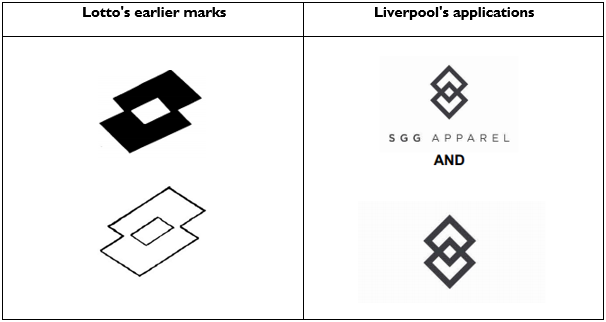 In assessing the conflicting marks, the visual comparison was of particular importance because of the nature of the goods, i.e., clothing, personal products, bags etc. Further, as the marks consisted of relatively simple line drawings, minor differences would be sufficient to distinguish between them.
The Hearing Officer concluded that the marks were "considerably different" stating that Liverpool's mark "is an interlocking diamond device, whereas the opponent's mark is rectangular". He also found the Opponent's evidence of its reputation for its double field device to be lacking and so the opposition failed.
If you would like to hear from experts on this and other brand subjects, join us on 2 October for our Brand Protection Masterclass.
[post_title] => When less is not always more: Issues registering and enforcing simple logos
[post_excerpt] =>
[post_status] => publish
[comment_status] => closed
[ping_status] => closed
[post_password] =>
[post_name] => when-less-is-not-always-more-issues-registering-and-enforcing-simple-logos
[to_ping] =>
[pinged] =>
[post_modified] => 2019-09-03 14:32:07
[post_modified_gmt] => 2019-09-03 14:32:07
[post_content_filtered] =>
[post_parent] => 0
[guid] => http://www.theclubhouseoffices.com/?p=9243
[menu_order] => 0
[post_type] => post
[post_mime_type] =>
[comment_count] => 0
[filter] => raw
)
[4] => WP_Post Object
(
[ID] => 9230
[post_author] => 9
[post_date] => 2019-09-25 10:30:45
[post_date_gmt] => 2019-09-25 10:30:45
[post_content] =>
Edition Copenhagen is one of the leading lithographic workshops in the world. The 1000m2 workshop and gallery space is located in a typically characteristic building in the Christianshavn district of Copenhagen. Each year Edition Copenhagen invites a number of international and Danish artists to create original lithographs within the workshop. Most of the invited artists have exhibited widely in leading galleries, contemporary art centres and museums around the world. As well as inviting established artists. Every year renowned artists visit the studios of Edition Copenhagen. For 60 years EC have printed and published editions to an international audience.
In assessing the conflicting marks, the visual comparison was of particular importance because of the nature of the goods, i.e., clothing, personal products, bags etc. Further, as the marks consisted of relatively simple line drawings, minor differences would be sufficient to distinguish between them.
The Hearing Officer concluded that the marks were "considerably different" stating that Liverpool's mark "is an interlocking diamond device, whereas the opponent's mark is rectangular". He also found the Opponent's evidence of its reputation for its double field device to be lacking and so the opposition failed.
If you would like to hear from experts on this and other brand subjects, join us on 2 October for our Brand Protection Masterclass.
[post_title] => When less is not always more: Issues registering and enforcing simple logos
[post_excerpt] =>
[post_status] => publish
[comment_status] => closed
[ping_status] => closed
[post_password] =>
[post_name] => when-less-is-not-always-more-issues-registering-and-enforcing-simple-logos
[to_ping] =>
[pinged] =>
[post_modified] => 2019-09-03 14:32:07
[post_modified_gmt] => 2019-09-03 14:32:07
[post_content_filtered] =>
[post_parent] => 0
[guid] => http://www.theclubhouseoffices.com/?p=9243
[menu_order] => 0
[post_type] => post
[post_mime_type] =>
[comment_count] => 0
[filter] => raw
)
[4] => WP_Post Object
(
[ID] => 9230
[post_author] => 9
[post_date] => 2019-09-25 10:30:45
[post_date_gmt] => 2019-09-25 10:30:45
[post_content] =>
Edition Copenhagen is one of the leading lithographic workshops in the world. The 1000m2 workshop and gallery space is located in a typically characteristic building in the Christianshavn district of Copenhagen. Each year Edition Copenhagen invites a number of international and Danish artists to create original lithographs within the workshop. Most of the invited artists have exhibited widely in leading galleries, contemporary art centres and museums around the world. As well as inviting established artists. Every year renowned artists visit the studios of Edition Copenhagen. For 60 years EC have printed and published editions to an international audience.
 On Tuesday 24th and Wednesday 25th September at The Clubhouse, St James's Peter Wissing from Edition Copenhagen will display some of their finest editions of orig. lithographs by artist like: Jake & Dinos Chapman, Marcel Dzama, Antony Gormley, Mona Hatoum, Jaime Hayon, Gary Hume, Chantal Joffe, Wangechi Mutu, Elizabeth Peyton, Ugo Rondinone, Lawrence Weiner, Clare Woods and many more.
Please come by and have an informal chat with Peter at The Clubhouse, St James’s.
For further information please contact: pws@editioncopenhagen.com
[post_title] => Edition Copenhagen Preview Event
[post_excerpt] =>
[post_status] => publish
[comment_status] => closed
[ping_status] => closed
[post_password] =>
[post_name] => studios-of-edition-copenhagen
[to_ping] =>
[pinged] =>
[post_modified] => 2019-09-26 08:44:42
[post_modified_gmt] => 2019-09-26 08:44:42
[post_content_filtered] =>
[post_parent] => 0
[guid] => http://www.theclubhouseoffices.com/?p=9230
[menu_order] => 0
[post_type] => post
[post_mime_type] =>
[comment_count] => 0
[filter] => raw
)
)
On Tuesday 24th and Wednesday 25th September at The Clubhouse, St James's Peter Wissing from Edition Copenhagen will display some of their finest editions of orig. lithographs by artist like: Jake & Dinos Chapman, Marcel Dzama, Antony Gormley, Mona Hatoum, Jaime Hayon, Gary Hume, Chantal Joffe, Wangechi Mutu, Elizabeth Peyton, Ugo Rondinone, Lawrence Weiner, Clare Woods and many more.
Please come by and have an informal chat with Peter at The Clubhouse, St James’s.
For further information please contact: pws@editioncopenhagen.com
[post_title] => Edition Copenhagen Preview Event
[post_excerpt] =>
[post_status] => publish
[comment_status] => closed
[ping_status] => closed
[post_password] =>
[post_name] => studios-of-edition-copenhagen
[to_ping] =>
[pinged] =>
[post_modified] => 2019-09-26 08:44:42
[post_modified_gmt] => 2019-09-26 08:44:42
[post_content_filtered] =>
[post_parent] => 0
[guid] => http://www.theclubhouseoffices.com/?p=9230
[menu_order] => 0
[post_type] => post
[post_mime_type] =>
[comment_count] => 0
[filter] => raw
)
)
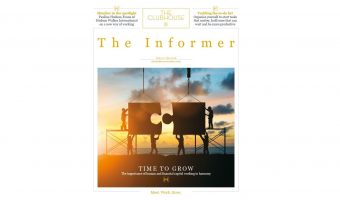


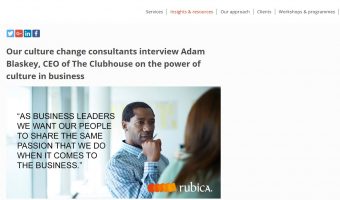
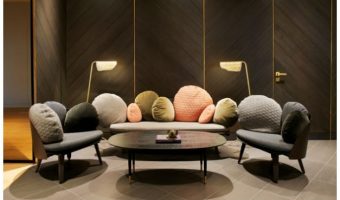

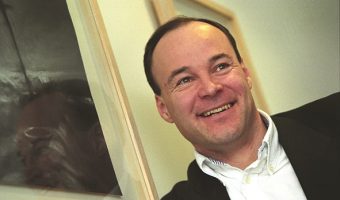
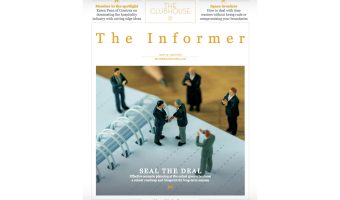
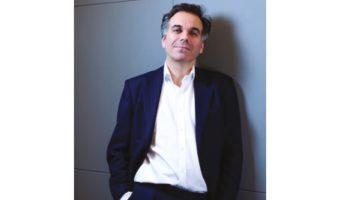


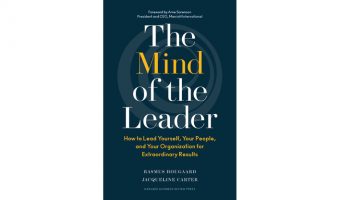







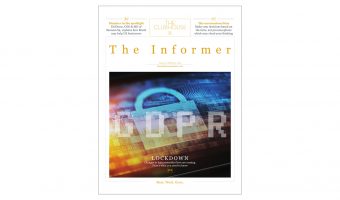













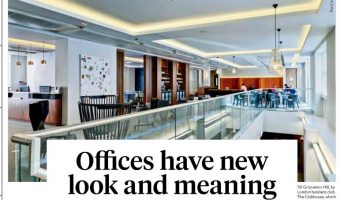



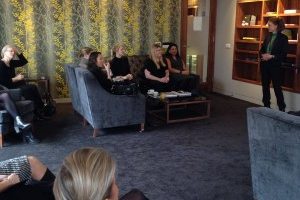

 Tell us about your company.
Ligentia is the UK’s largest and fastest growing international freight technology business. Myself and 500 colleagues around the world manage the international freight and supply chains for some of the worlds leading retailers, consumer brands, and manufacturers. We work with a cross section of multi-nationals, SME’s and home office start-ups, and develop long lasting partnerships with most customers, many of whom we have grown internationally with over a long period of time.
We combine clever but easy to use technology, deep sector and regional expertise, with 365/24/7 customer service (delivered by long serving Ligentia industry experts not call centres) to ensure our customers can focus on design, manufacture, marketing and sales, and leave us to deal with factories, suppliers, making sure products and material are in the right place, at the right time and in the right quantity.
We also support customers in reducing carbon footprint with simple and cost effective initiatives that benefit them, their customers and the planet.
What has been your biggest success so far?
We grew our international business from scratch in 2010 to a position where, this year, over 50% of our profits now come from our offices in China, Asia, Australia, Africa and Poland. We did this all from cash flow and with no long term debt. It was a massive challenge, a major investment of time and cash, and a big risk to do this during the Global Financial Crisis. We pulled it off, and are now a much more balanced and multi-cultural organisation, and in some very fast growing international markets.
What projects excite you right now?
There are 2 major projects we are really excited about!
The first is our investment in a new technology centre of excellence in Leeds. We are investing around £8m over the next 3 years in next generation technologies such as automation, artificial intelligence, machine learning, dynamic pricing and data analytics, all housed in a brand new low carbon tech centre in Leeds called Nexus (a part of Leeds University) We have an official launch in September, but are already open and recruiting some of the finest tech talent to support the project.
Our second is what we are calling ‘Ligentia Remastered’ This a complete internal and external realignment of the business with what is a radically different environment than 10 years ago. This is very much not a skin deep rebrand, but a radical remastering of how we work, communicate with customers, internal values, and ways of working. A lot of focus is on simplifying language, creating self-help tools, knowledge hubs and tools to make our services and knowledge cheaper and easier to access. We are driving more open pricing, improving communication with live chat via WhatsApp and WeChat, and focussing on creating an international community that makes it easy for local and international customers to collaborate by sharing transport, freight space and costs. Equally, people who devote their lives to public service are pretty inspirational.
How has being a member of The Clubhouse contributed to the success of your business?
Collaboration and innovation are really important cultural enablers for us, and work space is critical to creating the right environment. The Clubhouse was our first experience with co-working spaces, and is fast becoming a centre of gravity for us in the UK, as it combines great locations, flexible costs and a sophisticated energy which would not be affordable to us in a traditional lease arrangement. We are freed from all the lease, IT, furniture, and facility management stuff, and it leaves us to focus on customers and technology.
We are now big believers in the use of co-working work spaces, and I think we will see many of our smaller offices gradually move this way over the next 3-5 years.
Where can members find you?
We base ourselves mainly at St James, and I’m normally close to a coffee machine.
Quick Fire Round:
Favourite place to go in London?
We love Thali on the Old Brompton Road, South Ken. It’s the best Indian restaurant in London, and Vic and his team are super friendly.
Who inspires you and why?
People who devote their lives to public service are pretty inspirational, as are entrepreneurs who create fast growing business based on innovative ideas and products that care for the planet, and employee people in a happy and rewarding environment. Creating wealth from doing the right thing in the right way is becoming more common, thankfully.
Best bit of advice you’ve been given?
My wife always says ‘Go with your gut’ and I think intuition is under-rated. Our sub-conscious starts absorbing experiences, images, sounds, smells, expressions, thoughts and outcomes, from when we are born. We all have this truly multi-dimensional database in our heads, and we should learn to have the confidence to use it more.
Which super power would you like to have?
Superman type flight (without the tights) would be pretty handy and be good for the planet.
What is the worst business ‘faux-pas’ you’ve committed?
I went pretty hard-sell in a meeting in China in the 90’s before I understood how things worked, and clearly got no-where. Making mistakes is a part of life, but developing an understanding of how business is done, a respect for the culture and values in the place you do business is critical if you want to succeed internationally.
For more about
Tell us about your company.
Ligentia is the UK’s largest and fastest growing international freight technology business. Myself and 500 colleagues around the world manage the international freight and supply chains for some of the worlds leading retailers, consumer brands, and manufacturers. We work with a cross section of multi-nationals, SME’s and home office start-ups, and develop long lasting partnerships with most customers, many of whom we have grown internationally with over a long period of time.
We combine clever but easy to use technology, deep sector and regional expertise, with 365/24/7 customer service (delivered by long serving Ligentia industry experts not call centres) to ensure our customers can focus on design, manufacture, marketing and sales, and leave us to deal with factories, suppliers, making sure products and material are in the right place, at the right time and in the right quantity.
We also support customers in reducing carbon footprint with simple and cost effective initiatives that benefit them, their customers and the planet.
What has been your biggest success so far?
We grew our international business from scratch in 2010 to a position where, this year, over 50% of our profits now come from our offices in China, Asia, Australia, Africa and Poland. We did this all from cash flow and with no long term debt. It was a massive challenge, a major investment of time and cash, and a big risk to do this during the Global Financial Crisis. We pulled it off, and are now a much more balanced and multi-cultural organisation, and in some very fast growing international markets.
What projects excite you right now?
There are 2 major projects we are really excited about!
The first is our investment in a new technology centre of excellence in Leeds. We are investing around £8m over the next 3 years in next generation technologies such as automation, artificial intelligence, machine learning, dynamic pricing and data analytics, all housed in a brand new low carbon tech centre in Leeds called Nexus (a part of Leeds University) We have an official launch in September, but are already open and recruiting some of the finest tech talent to support the project.
Our second is what we are calling ‘Ligentia Remastered’ This a complete internal and external realignment of the business with what is a radically different environment than 10 years ago. This is very much not a skin deep rebrand, but a radical remastering of how we work, communicate with customers, internal values, and ways of working. A lot of focus is on simplifying language, creating self-help tools, knowledge hubs and tools to make our services and knowledge cheaper and easier to access. We are driving more open pricing, improving communication with live chat via WhatsApp and WeChat, and focussing on creating an international community that makes it easy for local and international customers to collaborate by sharing transport, freight space and costs. Equally, people who devote their lives to public service are pretty inspirational.
How has being a member of The Clubhouse contributed to the success of your business?
Collaboration and innovation are really important cultural enablers for us, and work space is critical to creating the right environment. The Clubhouse was our first experience with co-working spaces, and is fast becoming a centre of gravity for us in the UK, as it combines great locations, flexible costs and a sophisticated energy which would not be affordable to us in a traditional lease arrangement. We are freed from all the lease, IT, furniture, and facility management stuff, and it leaves us to focus on customers and technology.
We are now big believers in the use of co-working work spaces, and I think we will see many of our smaller offices gradually move this way over the next 3-5 years.
Where can members find you?
We base ourselves mainly at St James, and I’m normally close to a coffee machine.
Quick Fire Round:
Favourite place to go in London?
We love Thali on the Old Brompton Road, South Ken. It’s the best Indian restaurant in London, and Vic and his team are super friendly.
Who inspires you and why?
People who devote their lives to public service are pretty inspirational, as are entrepreneurs who create fast growing business based on innovative ideas and products that care for the planet, and employee people in a happy and rewarding environment. Creating wealth from doing the right thing in the right way is becoming more common, thankfully.
Best bit of advice you’ve been given?
My wife always says ‘Go with your gut’ and I think intuition is under-rated. Our sub-conscious starts absorbing experiences, images, sounds, smells, expressions, thoughts and outcomes, from when we are born. We all have this truly multi-dimensional database in our heads, and we should learn to have the confidence to use it more.
Which super power would you like to have?
Superman type flight (without the tights) would be pretty handy and be good for the planet.
What is the worst business ‘faux-pas’ you’ve committed?
I went pretty hard-sell in a meeting in China in the 90’s before I understood how things worked, and clearly got no-where. Making mistakes is a part of life, but developing an understanding of how business is done, a respect for the culture and values in the place you do business is critical if you want to succeed internationally.
For more about  The way things are
Underlying beliefs are incredibly powerful. They are what can keep cultures stuck and drive how we act, what we pay attention to and the decisions we make. They are often difficult to describe, intangible, and only understood by people who've become used to the way the organisation works over a period of time.
These assumptions are one of the things that can make it hard for new recruits to ‘fit in’. Anyone who has joined an organisation will recognise the feeling of being the newbie – getting to grips with what’s allowed, tolerated and required in the course of getting work done e.g. Is it OK to bring half-formed ideas to the table or do I need a fully worked up proposal? Can I knock on a senior leader’s office door or do I have to make an appointment?
Three ways to help people fit in and flourish
So how can we use our understanding of the culture iceberg to help us both recruit people who are a good culture fit and help them ‘fit in’ and flourish quickly?
1.Understand the underpinnings of your culture
If a definition of the organisation’s culture already exists, sense check whether it goes deep enough to include existing assumptions and beliefs. If not, explore them.
Use a method like appreciative inquiry to uncover the beliefs that are helping the organisation and that you might want to amplify. Or simply introduce conversational prompts like ‘What are we assuming here?’ or ‘What are we taking for granted?’ to increase awareness of what may be going on beneath the surface. There may be things that are currently hidden that need to be noticed and talked about in order to help new recruits integrate quickly and be successful.
2. Paint an accurate picture
Often the ‘official’ values and expected behaviours of an organisation don’t fully represent reality but are still what we rely on to market our organisational culture to prospective team members. Our intent is to help them understand whether they want to be part of the organisation and how well they’ll fit in. But it can lead to a mismatch between expectations and reality, undermining trust from the get-go.
Describe your culture accurately and honestly. Better to say we are ‘working towards’ or ‘aspire to have’ a innovative culture rather than say the culture is one of innovation when it isn’t…yet.
3. Watch for the pitfalls
Hiring managers are people and, if they’ve been in their role for any length of time, are likely to have assimilated the organisation’s norms. Be aware that this can result in unconscious flaws in the recruitment process. For example an organisation has built a successful legacy on a foundation of quality and safety but aims to respond to competitive pressures by becoming more innovative. They decide to hire more ‘green’ thinkers – people with behaviours and mindsets that support innovation.
As the process gets underway, the hiring manager becomes unconsciously conflicted by their unchanged legacy beliefs like, “a safe pair of hands is what works best for us”. As a result, the search slowly widens to find candidates who fulfil both the old and new criteria. The expectations are unrealistic and either a match can’t be found, or the manager settles for a hire who doesn’t quite hit the original brief. As a result, the new strategy is compromised from the outset.
Equip hiring managers with the tools and ability to consciously choose which old ideas to let go of, and what trade-offs they may need to be open to in order to bring in the behaviours you are seeking.
Summary
Culture is the character of the organisation. Those that cultivate strong, attractive characters understand the behaviours they need to deliver their goals and the beliefs that reinforce or get in the way of those behaviours. Using this understanding to shape every touchpoint through an employee’s journey ensures the right people are attracted and recruited and that they want to stay and get fully involved. Ultimately, we can build a consistent and collective culture that focusses effort, helps people work together and make decisions with more ease and greater impact because of the shared sense of who we are, what’s necessary and what’s important.
This article was written by Caroline Gosling, Director of Culture & Engagement at Rubica Change & Analytics:
The way things are
Underlying beliefs are incredibly powerful. They are what can keep cultures stuck and drive how we act, what we pay attention to and the decisions we make. They are often difficult to describe, intangible, and only understood by people who've become used to the way the organisation works over a period of time.
These assumptions are one of the things that can make it hard for new recruits to ‘fit in’. Anyone who has joined an organisation will recognise the feeling of being the newbie – getting to grips with what’s allowed, tolerated and required in the course of getting work done e.g. Is it OK to bring half-formed ideas to the table or do I need a fully worked up proposal? Can I knock on a senior leader’s office door or do I have to make an appointment?
Three ways to help people fit in and flourish
So how can we use our understanding of the culture iceberg to help us both recruit people who are a good culture fit and help them ‘fit in’ and flourish quickly?
1.Understand the underpinnings of your culture
If a definition of the organisation’s culture already exists, sense check whether it goes deep enough to include existing assumptions and beliefs. If not, explore them.
Use a method like appreciative inquiry to uncover the beliefs that are helping the organisation and that you might want to amplify. Or simply introduce conversational prompts like ‘What are we assuming here?’ or ‘What are we taking for granted?’ to increase awareness of what may be going on beneath the surface. There may be things that are currently hidden that need to be noticed and talked about in order to help new recruits integrate quickly and be successful.
2. Paint an accurate picture
Often the ‘official’ values and expected behaviours of an organisation don’t fully represent reality but are still what we rely on to market our organisational culture to prospective team members. Our intent is to help them understand whether they want to be part of the organisation and how well they’ll fit in. But it can lead to a mismatch between expectations and reality, undermining trust from the get-go.
Describe your culture accurately and honestly. Better to say we are ‘working towards’ or ‘aspire to have’ a innovative culture rather than say the culture is one of innovation when it isn’t…yet.
3. Watch for the pitfalls
Hiring managers are people and, if they’ve been in their role for any length of time, are likely to have assimilated the organisation’s norms. Be aware that this can result in unconscious flaws in the recruitment process. For example an organisation has built a successful legacy on a foundation of quality and safety but aims to respond to competitive pressures by becoming more innovative. They decide to hire more ‘green’ thinkers – people with behaviours and mindsets that support innovation.
As the process gets underway, the hiring manager becomes unconsciously conflicted by their unchanged legacy beliefs like, “a safe pair of hands is what works best for us”. As a result, the search slowly widens to find candidates who fulfil both the old and new criteria. The expectations are unrealistic and either a match can’t be found, or the manager settles for a hire who doesn’t quite hit the original brief. As a result, the new strategy is compromised from the outset.
Equip hiring managers with the tools and ability to consciously choose which old ideas to let go of, and what trade-offs they may need to be open to in order to bring in the behaviours you are seeking.
Summary
Culture is the character of the organisation. Those that cultivate strong, attractive characters understand the behaviours they need to deliver their goals and the beliefs that reinforce or get in the way of those behaviours. Using this understanding to shape every touchpoint through an employee’s journey ensures the right people are attracted and recruited and that they want to stay and get fully involved. Ultimately, we can build a consistent and collective culture that focusses effort, helps people work together and make decisions with more ease and greater impact because of the shared sense of who we are, what’s necessary and what’s important.
This article was written by Caroline Gosling, Director of Culture & Engagement at Rubica Change & Analytics:  The decision is part of a long-running dispute between Adidas and Belgian company Shoe Branding Europe BVBA, which owns the Patrick sportswear brand (featuring a two stripe logo). In 2014, Shoe Branding filed an application for a declaration of invalidity of Adidas' mark on the basis that it was devoid of any distinctive character.
Adidas argued that the mark had acquired distinctive character through use but, despite producing almost 12,000 pages of evidence relating to its use, the General Court agreed with the EUIPO that Adidas had not identified sufficient evidence of use of the mark as registered. Adidas also tried to argue that the mark should be considered as a pattern mark, rather than a figurative mark. The General Court disagreed with Adidas and noted that the EUIPO can only consider what is set out in the application for registration and corresponding description.
In relation to acquired distinctiveness, much of Adidas' evidence showed use of signs which, the Board of Appeal had concluded, differed from the mark significantly, for example, where the colour scheme was reversed (i.e. white stripes on a black background) and use of sloping signs. These uses altered the distinctive character of the mark as registered. In particular, the General Court took into account the "extreme simplicity" of Adidas' mark, stating that, "the simpler the mark, the less likely it is to have a distinctive character and the more likely it is for an alteration to that mark to affect one of its essential characteristics and the perception of that mark by the relevant public".
Further, Adidas had to show use of the mark throughout the EU to demonstrate acquired distinctiveness. Whilst it had produced 23 market surveys in a number of EU member states, only five of those were relevant, with the other 18 being carried out in relation to signs that were not broadly equivalent to the mark as registered. Whilst the CJEU confirmed in the KitKat case (
The decision is part of a long-running dispute between Adidas and Belgian company Shoe Branding Europe BVBA, which owns the Patrick sportswear brand (featuring a two stripe logo). In 2014, Shoe Branding filed an application for a declaration of invalidity of Adidas' mark on the basis that it was devoid of any distinctive character.
Adidas argued that the mark had acquired distinctive character through use but, despite producing almost 12,000 pages of evidence relating to its use, the General Court agreed with the EUIPO that Adidas had not identified sufficient evidence of use of the mark as registered. Adidas also tried to argue that the mark should be considered as a pattern mark, rather than a figurative mark. The General Court disagreed with Adidas and noted that the EUIPO can only consider what is set out in the application for registration and corresponding description.
In relation to acquired distinctiveness, much of Adidas' evidence showed use of signs which, the Board of Appeal had concluded, differed from the mark significantly, for example, where the colour scheme was reversed (i.e. white stripes on a black background) and use of sloping signs. These uses altered the distinctive character of the mark as registered. In particular, the General Court took into account the "extreme simplicity" of Adidas' mark, stating that, "the simpler the mark, the less likely it is to have a distinctive character and the more likely it is for an alteration to that mark to affect one of its essential characteristics and the perception of that mark by the relevant public".
Further, Adidas had to show use of the mark throughout the EU to demonstrate acquired distinctiveness. Whilst it had produced 23 market surveys in a number of EU member states, only five of those were relevant, with the other 18 being carried out in relation to signs that were not broadly equivalent to the mark as registered. Whilst the CJEU confirmed in the KitKat case ( Jolley argued that its application represented the centre circle of a football pitch, which was consistent with its existing brand (Next Goal Wins) for which it also owns a UK trade mark.
Jolley argued that its application represented the centre circle of a football pitch, which was consistent with its existing brand (Next Goal Wins) for which it also owns a UK trade mark.
 However, the Hearing Officer was not convinced by the argument that Jolley's mark would be viewed as a football pitch and instead concluded that both marks would be seen as "a combination of two ordinary geometric elements; a circle and a line." As the marks were found to be visually similar to a high degree, Samsoe's opposition was successful.
In contrast, in an
However, the Hearing Officer was not convinced by the argument that Jolley's mark would be viewed as a football pitch and instead concluded that both marks would be seen as "a combination of two ordinary geometric elements; a circle and a line." As the marks were found to be visually similar to a high degree, Samsoe's opposition was successful.
In contrast, in an  In assessing the conflicting marks, the visual comparison was of particular importance because of the nature of the goods, i.e., clothing, personal products, bags etc. Further, as the marks consisted of relatively simple line drawings, minor differences would be sufficient to distinguish between them.
The Hearing Officer concluded that the marks were "considerably different" stating that Liverpool's mark "is an interlocking diamond device, whereas the opponent's mark is rectangular". He also found the Opponent's evidence of its reputation for its double field device to be lacking and so the opposition failed.
If you would like to hear from experts on this and other brand subjects, join us on 2 October for our
In assessing the conflicting marks, the visual comparison was of particular importance because of the nature of the goods, i.e., clothing, personal products, bags etc. Further, as the marks consisted of relatively simple line drawings, minor differences would be sufficient to distinguish between them.
The Hearing Officer concluded that the marks were "considerably different" stating that Liverpool's mark "is an interlocking diamond device, whereas the opponent's mark is rectangular". He also found the Opponent's evidence of its reputation for its double field device to be lacking and so the opposition failed.
If you would like to hear from experts on this and other brand subjects, join us on 2 October for our  On Tuesday 24th and Wednesday 25th September at The Clubhouse, St James's Peter Wissing from Edition Copenhagen will display some of their finest editions of orig. lithographs by artist like: Jake & Dinos Chapman, Marcel Dzama, Antony Gormley, Mona Hatoum, Jaime Hayon, Gary Hume, Chantal Joffe, Wangechi Mutu, Elizabeth Peyton, Ugo Rondinone, Lawrence Weiner, Clare Woods and many more.
Please come by and have an informal chat with Peter at The Clubhouse, St James’s.
For further information please contact:
On Tuesday 24th and Wednesday 25th September at The Clubhouse, St James's Peter Wissing from Edition Copenhagen will display some of their finest editions of orig. lithographs by artist like: Jake & Dinos Chapman, Marcel Dzama, Antony Gormley, Mona Hatoum, Jaime Hayon, Gary Hume, Chantal Joffe, Wangechi Mutu, Elizabeth Peyton, Ugo Rondinone, Lawrence Weiner, Clare Woods and many more.
Please come by and have an informal chat with Peter at The Clubhouse, St James’s.
For further information please contact: